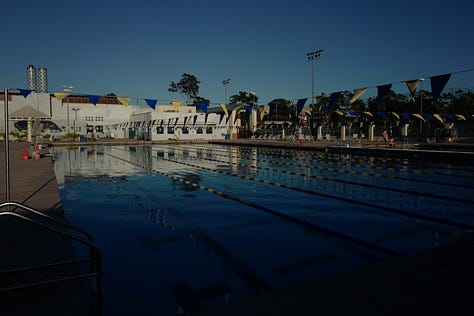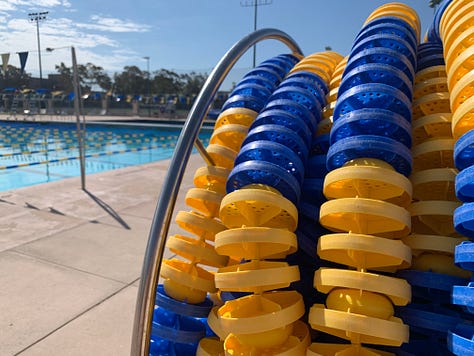Getting to Know Your Fitness Needs
Issue No. 8 : Learn the critical knowledge of exercise physiology, nutrition, sleep, and stress management to get better, faster, and fitter plus a few book tips



During my explorations and experiments of living with fewer better things, wellbeing has always been the core priority. I believe that if we switch our focus from consumption towards wellbeing, we’ll live better, longer, and healthier lives.
Unfortunately, our global society is not designed around health and wellbeing but around growth, materialism, and consumption. People’s health and wellbeing is only a priority if it can be commoditized, monetized, controlled, and owned.
But instead of fighting the big political and commercial powers very much outside of our control, we can focus our time, attention, and creative energy on what we can directly control in our lives: how we decide to live in this world.
After having spent five years between 2013 and 2018 traveling the world on a weekly basis I was physically and mentally exhausted. It took me almost 18 months of just being in one single place to get back to a more normal existence.
Once this period was over, which happened to coincide with the pandemic, I moved to a surfshack by the beach in Southern California and decided to change my life and start living a very healthy and fitness-oriented lifestyle.
I knew little about nutrition (other than that vegetables are good for you and fast food is bad) and exercise physiology. And I knew absolutely nothing about how to train and how to rest and recover to gradually get better, fitter, and stronger.
During those first months of the pandemic, when we were asked (ordered in some parts of the world) to stay at home or at least six feet away, I jumped on my bike in the dark early morning hours and biked along the coast for an hour or two.
Being alone on the road, free from restrictions, seeing the sun rise in the east and feeling the morning ocean breeze from the west became the highlight of my day. When I arrived back at my place I felt alive and filled with positive chemicals.
My plan was to work both on my aerobic (cardiovascular) and anaerobic (power and strength) fitness. I wanted it all: strong heart, lungs, muscles, and bones. But the only thing that happened was that I lost a lot of weight.
Now, for some people this might sound like a great result, but for someone with an ectomorph body type with a fast metabolism and difficulty to retain muscles and fat, it was just disastrous. I was effectively shrinking.
I simply had to go back to the drawing room table and learn about training, nutrition, exercise physiology, and rest and recovery to reach my then goals of improving my physical fitness and to get better at surfing.
First thing that happens when you dive into the online rabbit whole of fitness is that you run into all these different products and supplements that promise you a body like Adonis and a really long life of eternal bliss. No surprise there.
But if you take a moment to learn about the evolution of humankind, you’ll know that we are uniquely designed for daily exercise and survival. Our autonomy is a wonderland of brilliant and magical design. You just have to tap into yours.
Here are a few simple things I learned:
My body needs fuel to power existence and physical activity (duh!). Fuel is measured in Kilocalories (often just called calories) and consists of the macronutrients carbohydrates, protein, and fat.
These macronutrients do different things:
Carbohydrates are converted into glucose (sugar) which is the body’s main source of energy.
Protein is the building blocks of muscles and powers growth and muscle repair.
Fat is also a source for energy and helps the body to absorb acids and hormones, power brain health, and to insulate and protect organs and body.
Needless to say, we need all three for our body and mind to work at its optimal. And if they all come from real whole foods, not processed or ultra-processed foods, they will deliver the purest and healthiest form of energy.
But the problem today is that there are more overweight than malnourished people in the world. We simply consume too much of everything, but it’s not just too much, it’s mostly food substance that is really bad for us.
To make a change, a change that I believe we all can make, we need to learn about how our body works, what fuel it needs, how exercise physiology works, and how to design a proper training plan and recovery that over time will deliver wonders.
Back to the shrinking.
To stay at the same weight, I needed to find the balance between calories in and calories out. If I started to exercise more I would need to increase my intake to just stay at par. How much is dependent on what activity I was doing.
There are two forms of physical activities: aerobic and anaerobic.
Aerobic exercise, also called cardio, is physical exercise of low or high intensity that depends on oxygen. Examples: running, swimming, and biking.
Anaerobic exercise is physical exercise that depends on energy stored in the muscles. Examples: weight lifting, sprinting, and bodyweight exercises.
We need both to exercise our hearts, lungs, muscles, and whole body.
Aerobic exercise feeds your muscles with oxygen through your bloodstream. Aerobic fitness is measured in VO2max which is the maximum amount of oxygen that your body can convert into energy–the higher number the better.
In anaerobic exercise your body breaks down glucose (sugar) stored in your muscles for short and intense workouts where you stress your muscles to failure so they can adapt, repair, and grow. That’s how muscles are built.
Over the past twenty years we have learned that daily physical exercise is not just great for the body but also necessary for our mental health, stress management, improved memory, to sharpen our intellect, and as of recently, longevity.
But also, the good news is that you don’t need all the bells and whistles that the fitness and wellbeing industry is selling. Here is what you need:
Keep reading with a 7-day free trial
Subscribe to Fewer Better Things to keep reading this post and get 7 days of free access to the full post archives.



